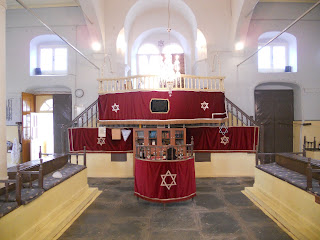Today was easily one of the best of the trip so far. We left
our hotel in Ioannina (pronounced ya-ni-nah) at 8:30 and met with a member of
the Jewish community there. She taught us about the unique and ancient history
of the Jews in Ioannina, which is very different from the history of the Jews
in the other places we visited because Jews did not come here following the
Expulsion. They were Ramoniotes, not Sephardic.
Jews first came to this central Greek city when the Second
Temple was destroyed around 70 CE. Fast-forward to the beginning of the 20th
century and after the Ottoman rule ended, many people moved to Jerusalem
because the Greeks made them close their stores on Sundays. In 1943 the Nazis
woke up the 1,850 Jews in Ioannina at three in the morning and took them by car
to Salonika in the snow. A memorial now stands where the old Jewish community
was.
Today there are only 35 Jews in the beautiful and quaint
town, and they only use the synagogue, which was built inside the walls of the
castle, during the holidays. They struggle to make a minyan, so they always
appreciate guests. This was my first time walking into a Ramoniote shul, which
has all of its benches perpendicular to the front of the sanctuary and the bima
in the back.
I also have this pretty sweet picture from directly under the chandelier that I wanted to share.
They even have a Torah that is over 360 years old!
The best part of the day had yet to come, as we drove 2
hours to the Monasteries of Meteora, near Kalambaka in central Greece. During
the drive I really began to appreciate Greece’s beauty. I think mountains are
the most beautiful landscapes in the world, and driving through them convinced
me that Greece is the most beautiful country I’ve seen (so far). I find it so
cool that the clouds “rest” on the tops of the mountains while the lush and abundant
leaves that cover the mountains change colors. It’s awesome rounding the corner and the view opens up
into a deep, beautiful valley containing a small village or two with red roofs
nestled into the crevasses of the mountains and valleys. We approached the
Monasteries of Meteora and this is what came into view.
These rocks were submerged underwater hundreds, maybe
thousands, of years ago, but after an earthquake the water was drained into the
sea and left these incredibly huge and magnificent rock formations.
24 total monasteries were built starting in the 14th
century, and some even took up to 70 years to build. Unfortunately only 6
remain because in 1943 the Nazis destroyed most of them.
The skulls of the monks who built the monasteries are
displayed for public, and as eerie as the idea is, it’s still pretty cool. (Sorry it's a little blurry, I was rushed)
Finally we stepped into the church only about fifteen
minutes before they closed it. It was by far the most spectacular church I’ve
ever seen because the walls and ceilings are completely covered in intricate
biblical paintings. Unfortunately we were not allowed to take pictures, but if there's one place I could take a picture it would have been the sanctuary.
I’m still on the high of being up in the clouds in the
Monasteries of Meteora, but I’m looking forward to the coming days. Tomorrow we
are getting up bright and early to visit Delphi, which is where the Oracle of
Delphi was, and then we are on to Athens for the last two days of our
incredible first trip.
"Champions find a way." -SB









No comments:
Post a Comment